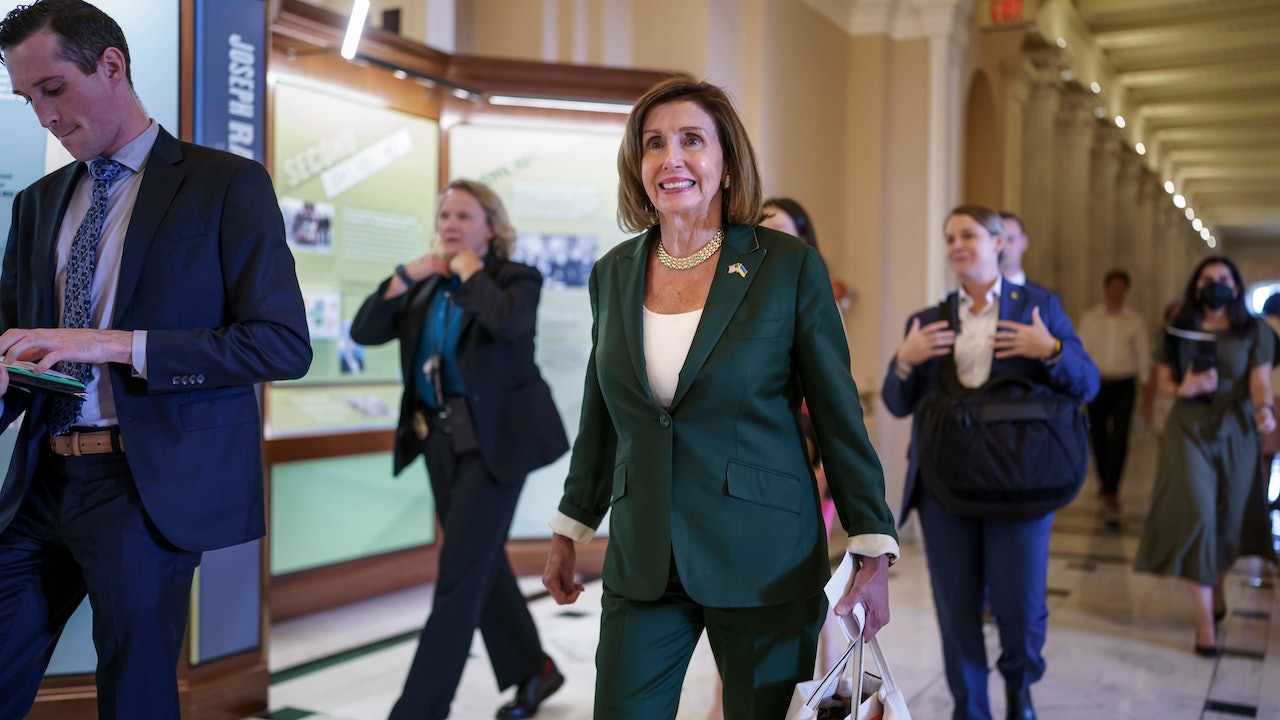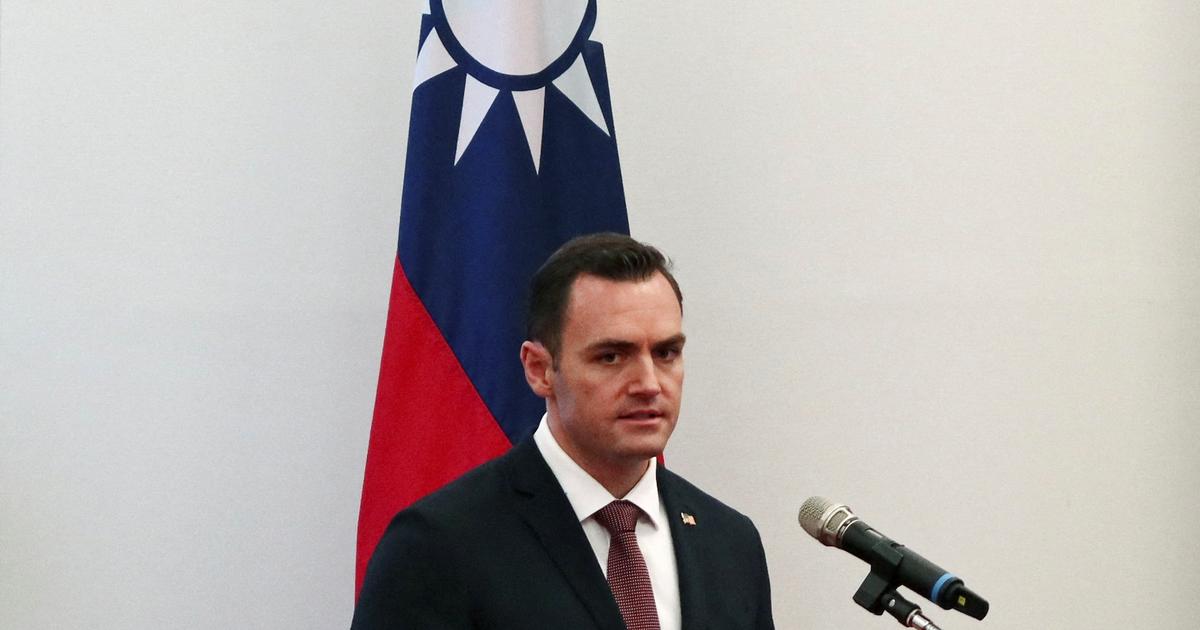At around 4:00 pm on July 31, Hong Kong time, it was rumored that the US Air Force Boeing C-40C transport aircraft "SPAR19" (modified from the Boeing 737 series) that Nancy Pelosi (also translated as Pelosi, Polosi) took Taking off from Hawaii, it is flying across the Pacific to East Asia.
The real-time flight tracking website Flightradar24 has continued to have more than 10,000 people tracking its movements in real time, but whether Pelosi is on the plane has not yet been fully determined.
A few hours earlier, the website of the Speaker of the U.S. House of Representatives had announced the four-country itinerary of Singapore, Malaysia, Japan, and South Korea, excluding Taiwan.
After China's strong warning, if Pelosi really flew to Taiwan, the consequences would certainly deserve global attention.
Since the media reported that Pelosi plans to visit Asia in August and the itinerary includes Taiwan, the warnings from Beijing are unprecedented.
U.S. President Joe Biden expressed his opposition to the military's view on July 20 that a visit to Taiwan is not a good idea. National Security Advisor Jake Sullivan, Defense Secretary Lloyd Austin and other White House aides have made it clear to her stake in the visit.
The Taiwan authorities, which have always been relying on foreigners to seek external support, have been extremely low-key on Pelosi's visit.
Some voices pointed out that the mid-term elections are approaching, and the Biden administration has performed poorly in various aspects such as curbing inflation and preventing economic recession. The Democratic Party is under pressure in this mid-term election. Pelosi, one of the power cores of the Democratic Party, can visit Taiwan if she visits Taiwan. Harvest a wave of dividends for being tough on China to boost the election.
Such a statement is not unreasonable. The question is, as the speaker of the US House of Representatives, how could Pelosi not be aware of the sensitivity of the Taiwan issue?
Don't you know that she's been in Congress for thirty-five years since she was elected to the House of Representatives in 1987?
Do all this just to make it difficult to get slapped in the face, or to provoke conflict?
She probably wouldn't have expected the former, and probably thought that a visit to Taiwan would raise concerns and not be a problem.
Turns out she was wrong.
On July 29, California time, Pelosi, as Speaker of the House of Representatives, seems to have started her trip to Asia. She is said to visit Japan, Singapore, Indonesia, and Malaysia. As for whether to visit Taiwan, China, it is still "to be determined" before the trip.
This is probably the first time Pelosi has mixed feelings on a trip.
SPAR19 location at around 4pm Hong Kong time on July 31st.
(Screenshot from Flightradar24 website)
If she visits Taiwan, will Pelosi's plane be targeted by the PLA?
Was it driven away, or allowed to dock?
are all unknowns.
If he does not visit, the speaker, who has been tough on Taiwan and other China-related issues countless times, has painstakingly planned a Taiwan-based visit, and he will have to bypass Taiwan and leave behind the infamy of allowing China to win.
Pelosi, who used to be good at manipulating public opinion and playing politics, seems to be unable to play this time.
White House aides blocked her visit, and Pelosi invited Michael McCaul, the top Republican on the House Foreign Affairs Committee, and Gregory Meeks, a Democrat, to "visit Taiwan" together, but was turned down.
Pelosi, 82, is not far from retirement.
The first female speaker in the history of the United States, the oldest speaker of the House of Representatives in the history of the United States, and four times as the speaker of the U.S. House of Representatives... With the honor, she will retire without incident, but whether or not to visit Taiwan now may make her Evening holiday is not guaranteed.
Why did Pelosi come to this point?
anachronistic cold war vintage
Pelosi was born into a Democratic political family in Baltimore, Maryland, in 1940.
In 1947, at the age of 7, Pelosi accompanied his father and witnessed the historic moment when his father became mayor of Baltimore.
Pelosi's father was the city's mayor from the age of 7 until she went to college.
When the classmates cast envious glances at the graduation ceremony, she is also proud of her father.
Affected by the family atmosphere, Pelosi attended the Democratic Convention at the age of 12. When she was in college, she attended Trinity College and chose to major in political science.
In 1961, she also attended the inaugural ball of then-President Kennedy.
Pelosi, left, and her father, Thomas D'Alesandro Jr, right, meet then-President Kennedy at the White House on March 28, 1961.
(Associated Press)
She is also a conservative Catholic. She has been influenced by liberal ideas in a strong political atmosphere since she was a child, and has strong moral and human rights concepts.
Her political leanings were influenced in part by her father, Thomas D'alesandro Jr.
Dalle Sandro was an Italian-American Democratic congressman before being elected mayor, and has been a core member of the Democratic Party since the 1930s.
Like other American politicians of the same period, Dallesandro, despite his self-proclaimed "leftist", was always wary of the Soviet Union and communism. He endorsed the civil rights movement but thought the communist model was too radical.
Pelosi's mother is a member of the Democratic Women's Club. Although she has not officially entered the political arena, she has often launched women's movements to support the Democratic Party and has always been closely related to politics.
Under the influence of her parents, Pelosi's political leanings were strongly neoliberal and "human rights values", and the Democratic Party at the time was also transforming in this direction.
Measuring everything in terms of ideology and human rights has almost accompanied Pelosi's political career.
Pelosi, 20, at Kennedy's inaugural ball on January 21, 1961.
(Facebook @Nancy Pelosi)
On Pelosi's official website, there is a text that says, "Pelosi has long advocated human rights around the world. She fights to improve human rights in China and hopes to link trade with improving human rights standards."
Pelosi has attacked China with "human rights" since 1989.
At the time of the June 4th Incident in China, she, who had just been a member of the House of Representatives for two years, proposed that the U.S. government grant the Chinese students who were in the U.S. at the time the right to stay in the U.S. after graduation, in order to prevent them from being subjected to "political persecution."
Two years later, in 1991, when Pelosi organized an American human rights organization to visit China, she carried a Chinese receptionist behind her back and pulled a black cloth strip in front of the Monument to the People's Heroes in Beijing's Tiananmen Square with the words "Dedicated to those who sacrificed for the cause of China's democracy." Martyr", and personally read the statement and presented white flowers.
Generally speaking, lawmakers invited to visit respect the host's arrangement, which is a basic courtesy, but Pelosi did the opposite. With her outrageous actions in Beijing's Tiananmen Square, it is said that China's then-premier Li Peng was furious.
On September 4, 1991, during a visit to Beijing, Pelosi and two Republican and Democratic members of Congress held a sign "Dedicated to the martyrs who died for the cause of democracy in China" at Tiananmen Square.
(Associated Press)
In May 1990, Pelosi and Senator Democratic Leader George J. Mitchell took the lead in launching Congress to oppose President Bush Sr.'s extension of China's most-favored-nation status.
At that time, the trade volume between China and the United States exceeded 20 billion US dollars, which was the fastest-growing foreign trade relationship in the United States. Pelosi and Bush broke out a fierce conflict, which made her immediately enter the vision of the top leaders of the two parties. Pelosi's quarrel with Bush Sr. was also frequently quoted on talk shows and the media, and her name rang through American politics almost overnight.
A little-known congressman challenged the president on the topic of China and became famous since then.
Pelosi, who has tasted the anti-China sweetness, is out of control on issues such as human rights.
After China's successful bid for the Olympics in 2000, she issued a press release saying, "Since the International Olympic Committee has authorized the Chinese government to host the 2008 Olympic Games, it must ensure that the Chinese government honors its promises, allows the news media full freedom to report current events in China, and Allow people to have freedom of movement at home. It is the responsibility of the International Olympic Games and the sponsors of the Olympic Games to ask the Chinese government to respect these fundamental freedoms during the Olympic Games and in the years leading up to 2008.” She also believes that the International Olympic Games will be held in 2008. It was "a mistake" to grant China the right to host the 2019 Summer Olympics.
She even publicly called for people to come to her hometown to disrupt the Olympic torch relay in San Francisco.
In the Beijing Winter Olympics more than a decade later, Pelosi publicly announced on the Internet in May 2021 that due to "human rights issues" in China, she called on countries not to send officials to the Beijing Winter Olympics.
It also warned Europe "not to cede telecommunications infrastructure to China".
On the Tibet issue, after the "3.14" violence in Lhasa in 2008, Pelosi openly met the Dalai Lama to show "solidarity".
When visiting Tibetan temples, the two have been holding hands, deliberately showing that the relationship between the two is extraordinary.
Pelosi publicly declared on the same day that if the international community does not put pressure on China on the Tibet issue, she will lose her "moral authority" to speak on human rights issues.
On April 9, driven by Pelosi, the House of Representatives passed a resolution calling for an end to "repression in Tibet and the release of those arrested during nonviolent demonstrations".
On the Xinjiang issue, Pelosi has always insisted that there are "forced labor" and "human rights issues" in Xinjiang, and that meeting with so-called "Uyghur human rights defenders" is more commonplace.
On December 8, 2021, the U.S. House of Representatives passed three bills on "human rights in China" in one day.
One is to "prevent forced labor of Uyghurs" and ensure that "commodities produced in Xinjiang, China (or related to Xinjiang)" are restricted from entering the U.S. market.
One is "genocide and crimes against Uyghurs and other religious and ethnic minorities", urging the US government to take action.
Another is the finding that "the International Olympic Games have failed to live up to their commitments to human rights".
Before the three bills were scheduled to be voted on, Pelosi declared that by passing the three bills, "the House wants to send a clear and direct message to China."
On May 8, 2019, the Taiwan Representative Office in the United States held a reception to commemorate the 40th anniversary of the Taiwan Relations Act at the American House of Representatives. House Speaker Nancy Pelosi was present to congratulate.
(Central News Agency)
On the Hong Kong issue, during the turmoil of Hong Kong's amendments in 2019, Pelosi publicly praised the violent activities of Hong Kong demonstrators as a "beautiful landscape", and publicly met with controversial figures such as Huang Zhifeng and He Yunshi in Washington, under the name of "human rights" and "democracy". ” and “Freedom” are the platforms for violent and illegal acts in Hong Kong.
The Taiwan issue is another extension of Pelosi's "democratic human rights values".
In her opinion, Taiwan is a model of the success of American democracy, while mainland China is a "negative actor" that threatens American democracy. In addition, her constituency, California, has a large number of immigrants from Hong Kong and Taiwan. The political views of these immigrants are basically They are all anti-communist and anti-unification, and they have formed a mess of anti-China lobby groups, such as "Taiwanese Public Affairs Council", "Freedom House" and "Southern Baptist Church".
In order to transfer votes and the interests behind it, anti-communism and anti-China have become Pelosi's political path dependence.
By Tom Tom, a member of the Pacific Committee on American International Policy.
In Platt's words: "She (Pelosi) has very little pleasure in Beijing, usually unforgiving and outright skepticism. She has trouble taking China's peaceful rise lightly." Even Pelosi herself said, " I have been the most hated person in China for more than 30 years."
Pelosi, born in 1940, was in her 50s at the end of the Cold War. It can be said that the Cold War shaped her outlook on life and values.
During the Cold War and for a long time after the end of the Cold War, upholding ideological human rights as the yardstick for measuring Sino-U.S. relations would not bring much trouble, and the U.S.’s national strength could support Pelosi to do whatever she wanted.
Pelosi initially thought that she could visit Taiwan, which is a misjudgment of China. China is no longer a China that can treat human rights issues at will, and the violation of China's core interests with democratic human rights values over sovereignty will not be tolerated and accepted.
The unexpected opposition from the White House also shows that ideology is not the only consideration in the face of national interests.
The Cold War is finally over.
After the end of the Cold War, globalization has developed rapidly, and the international landscape has undergone brand-new changes. The real interests of countries are intertwined like never before.
After witnessing history, Pelosi can't escape the shackles of history, making it all out of place.
Mistaking Taihai for a Theater
Pelosi served for 20 years as a member of the Democratic National Committee representing California from 1976 to 1996.
In 1984, Pelosi assumed the chair of the California Democratic Party.
In 1987, Pelosi ran for Congress successfully and was re-elected one after another. By 2022, she has served in Congress for 35 years.
On April 7, 1987, Pelosi met with the media outside the Democratic Party's campaign headquarters in San Francisco.
(Associated Press)
In the political framework of the United States, Congress has always acted as a "troublemaker" and a "negative background voice".
The primary task of MPs, party chairmen and speakers is to elect and serve the interests of the party.
Creating conflicts and drama in the name of spurs is a compulsory course for political party struggles.
Being able to become the party whip of the Democratic Party and the speaker of the House of Representatives is due to Pelosi's very successful struggle against the Republican Party, which also shows that she has perfectly combined theatrical performer personality and contradiction maker.
Pelosi, who has the labels of "Republican Nemesis" and "Devil", has always been an enemy of the Republican Party.
She has slammed Republican policies, calling Republicans "immoral" and "corrupt," and publicly accusing Republican President George Bush of being an "incompetent leader." Not a leader...he's a man without judgment, inexperience, and no knowledge of what he's trying to decide...his shallowness hasn't changed since he took office."
Bush Jr. once described Pelosi as an "extremely liberal woman" who believed that having her lead Congress "would be a national security disaster."
Pelosi also retorted Bush Jr., accusing him of being a "liar, stupid and dangerous person who cannot be trusted."
On February 4, 2020, at the site of the State of the Union address, Trump refused to shake hands with U.S. House Speaker Nancy Pelosi (right in the second row), who tore up Trump's speech in public.
(Associated Press)
Pelosi has a deep political feud with Republican President Donald Trump.
On February 4, 2020, then-President Trump delivered his last State of the Union address to Congress.
Before delivering the speech, Trump handed a copy of the speech to Pelosi, who was standing behind him, but ignored Pelosi's outstretched hand.
After Trump's speech, Pelosi ripped a copy of the speech in half in full view.
From the initial "Russia" investigation to the later "Umban" impeachment, from blocking Trump's funds for building a border wall, to tearing up Trump's congressional speech, Pelosi has always played Trump The role of "the most powerful political opponent".
Throughout 2020, the two have not even spoken face-to-face once.
Pelosi said that to "save time," she would just communicate with Trump's representative.
Trump, when evaluating Pelosi, called her a "disgusting, vindictive, and terrible person."
In 2019, when Pelosi was elected House Speaker for the third time, the New York Times commented: "With the Democrats taking over the House, a new era of controversial Washington divisive politics has begun."
Unlike other politicians who have experienced transitions from congressman to White House staff, who are prone to rational transitions from offstage to onstage, Pelosi has been serving in Congress.
Occupational inertia determines the habit of standing on the opposite side as an opponent, accustomed to performing, accustomed to making trouble without taking responsibility, and accustomed to measuring a thing from whether it can obtain political benefits.
For her, visiting Taiwan means defending democracy and freedom, fighting for electoral interests, and performing a tough theater on China, killing three birds with one stone.
Today, such political manipulation fails in the face of China.
The seriousness of major-country politics and the complexity of Sino-US relations can no longer tolerate anyone's random performances and indiscriminate play on the Taiwan issue.
China doesn't like the idea of the US handling Sino-US relations in a condescending manner, and it doesn't like the idea that the US Congress just doesn't take responsibility for making trouble.
Pelosi must understand that the domestic political rules of the United States are not universal, which is the fundamental reason for her failure to advance and retreat.













